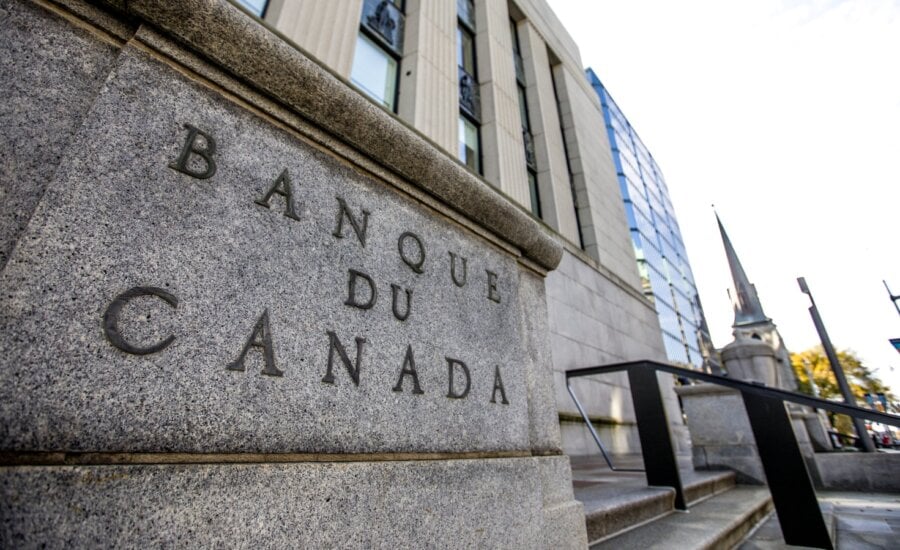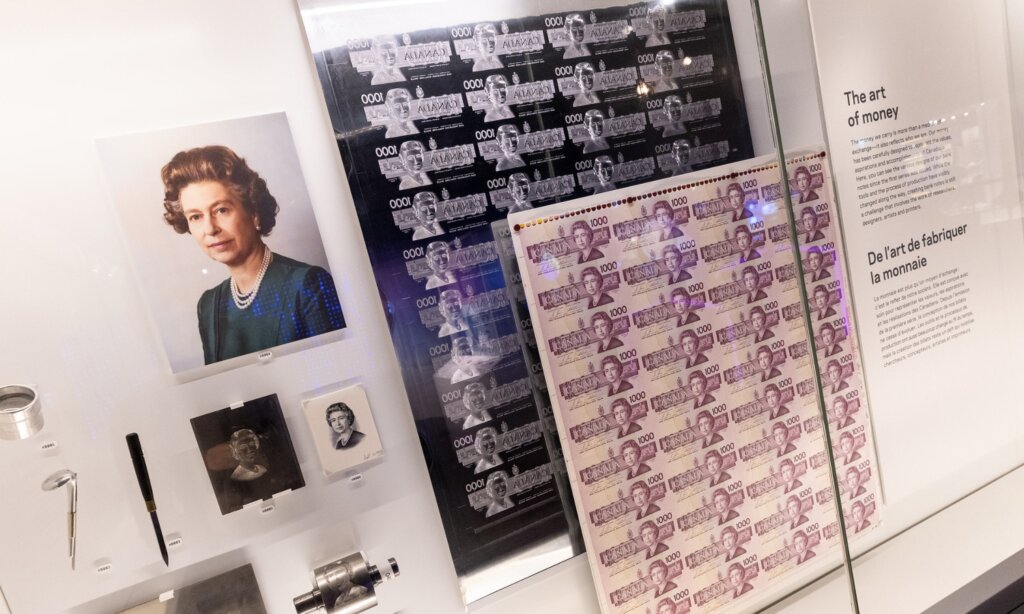What would a central bank digital currency mean for Canada? We ask 5 experts
The Bank of Canada is exploring whether we need a national digital currency. Five financial experts weigh in on the potential benefits and risks.
Advertisement
The Bank of Canada is exploring whether we need a national digital currency. Five financial experts weigh in on the potential benefits and risks.

Canadians have long embraced digital transactions. We make purchases, pay bills and transfer money to people around the world with the tap of a card or the click of a button—every single day. We do all of this using regular, government-backed Canadian dollars.
Yet the Bank of Canada (BoC) is actively researching the idea of a central bank digital currency (CBDC) in Canada. Though it does not see an immediate need for a Canadian CBDC, the BoC is preparing for the possibility that cash may one day fall out of use entirely. It’s not alone—central banks in many other countries are also pondering a digital currency.
The launch of a Canadian CBDC (an unfortunate acronym that doesn’t do a digital loonie justice) would have wide-ranging implications for the Canadian banking system and Canadians’ access to legal tender. For insight on what to expect from a digital loonie, we asked five money experts with different financial specialties to share their perspectives. You can read their responses below.
But first, let’s look at what CBDCs are, how they work, and when the Bank of Canada expects to introduce one.
A CBDC is a digital form of fiat money (currency declared legal tender by government decree). Informally called a GovCoin, a CBDC or digital dollar is backed and regulated by a country’s central bank and serves as legal tender. A CBDC operates within a centralized system, meaning digital transactions would be secure and reliable. A Canadian CBDC would function exactly like cash, except you would also be able to use it for online purchases and send it electronically to other people and companies, including financial institutions and anywhere you pay your bills.
Not yet. The BoC says it “doesn’t see a need for a digital dollar right now.” However, it’s studying the issue with the expectation that “Canada may need one in the future.” Although the BoC would issue and regulate the digital version of our national currency (as it does Canadian coins and bills), the federal government would ultimately determine if or when to issue a digital dollar.
There are currently no plans to introduce a CBDC in Canada. Rather, the BoC is researching the need for one in the future. As such, it held a public consultation from May 8 to June 19, 2023, to gather feedback from Canadians. The online survey asked respondents about the features of a CBDC that would matter most to them. Over 85,000 Canadians participated. Their feedback is now being shared with researchers and policymakers, and it will be included in a report coming later this year.
No. There are fundamental differences between CBDCs and cryptocurrencies. Here are some of the main ones.
As of June 2023, more than 100 countries were actively exploring or engaging in the use of CBDCs, according to a report by finance publication Finbold. Among those countries, 11 had already launched a CBDC, and 21 were piloting one. The number of countries in “advanced exploration phases” grew from 50 in May 2022 to 64 in June 2023.
We asked five experts to share their perspectives on a Canadian digital dollar. We’ve included their responses below—they touch on everything from the need for a CBDC in Canada to the benefits for unbanked Canadians and the potential security risks.
Over the millennia, many different things have been used as money, providing people with ways of making transactions, saving for the future, and keeping track of finances. During Canada’s early days, beaver skins, shell and glass beads, and even playing cards were popular forms of currency. Awkward to use or easy to counterfeit, they were replaced by metal coins. Subsequently, bank notes with fanciful designs and colours to deter counterfeiting gained favour. They were cheap to produce and could be easily tucked into pockets and purses.

Most recently, privately issued cybercurrencies have gained a degree of acceptance as users can make anonymous payments at the click of a computer mouse. Now, central banks, including the Bank of Canada, are actively investigating the merits of issuing their own digital currencies.
It is an idea worthy of consideration. Unlike paper bank notes, a digital currency would be more difficult to steal and impossible to counterfeit. It would also provide central banks with another policy instrument. Assuming paper money was discontinued, a digital currency might also hinder the underground economy. No longer could cash payments be made under the table.
But does anybody want a cyber–Canadian dollar? Most Canadians, especially younger Canadians, don’t use cash, relying instead on debit or credit cards, or even their phones to pay for goods and services. Would this change if the Bank of Canada introduced a cyber–Canadian dollar? As well, would we want to have a financial system that consists solely of bits and bytes? If the power grid were to fail, so does your ability to make transactions—a lesson many learnt the hard way during weather events and other disasters.
The fact of the matter is that Canadians have already gone digital; cash hasn’t been king for a very long time. A digital currency may be more of a financial cul-de-sac rather than the end of money.
James Powell is a retired senior central banker and the author or co-author of several books dealing with Canadian monetary and financial history, including A History of the Canadian Dollar. He writes a blog called Today in Ottawa’s History.
The digitalization of money is rapidly transforming the global financial landscape, and Canada is actively exploring the potential of a CBDC. A CBDC could impact Canada’s payment landscape, potentially ushering in a new era of convenience, efficiency and financial inclusion. However, there are risks and complexities to consider.
While the Government of Canada will ultimately make the decision as to whether or not to introduce a CBDC into the Canadian economy, the Bank of Canada is leading the exploration of issuing a CBDC for future use that Canadians can trust. Payments Canada is supporting the Bank of Canada and could have a role given our unique position as operator of Canada’s national payment infrastructure. It would leverage and allow Payments Canada’s payment systems to support a CBDC. How a CBDC would impact existing payment methods must be considered, and how the future real-time payments system could be leveraged.
As Canada progresses its work related to a CBDC, the following key policy considerations remain top of mind:
Many countries are exploring or implementing their own digital currencies. The Bahamas recently launched its CBDC, called the Sand Dollar. China, India and Thailand are in the pilot phase of their journeys. Canada, for its part, is actively positioning itself to make informed decisions and ensure a CBDC would align with its unique financial landscape and public policy objectives—the continued promotion of safety, soundness and efficiency of its payment systems.
Charl Ackerman is director of policy at Payments Canada, a public purpose, non-profit organization that ensures financial transactions in Canada are carried out safely and securely.
Compared to the cryptocurrencies many Canadians currently use, a CBDC would offer less access, anonymity and ownership. Fundamentally, a digital dollar would be convenient, but the trade-off would be personal freedom and privacy.

Canadians should not assume their information would remain anonymous with a digital dollar. A CBDC would allow the government to monitor financial activity and potentially share users’ personal and financial information with other government agencies and even commercial entities. CBDCs collect and use vast pools of personally identifiable information that would be an irresistible target for cybercriminals. Senior citizens and those less experienced with technology would be especially vulnerable.
The CBDC’s traceability could drive cybercrime deeper into the digital world and further complicate the work of law enforcement. As with any major societal disruption—which the introduction of a new digital currency would be—spear phishing, ransomware and social engineering attacks would ensue. The CBDC could also become a potential target for state-sponsored cybercriminals who want to paralyze Canada’s financial infrastructure.
Canadians should not assume their information would remain anonymous with a digital dollar.
Lastly, a digital dollar would only be available in electronic form, and therefore not considered physical property like cash or gold. This raises the question: Who owns it? If it is by the Bank of Canada and not by the user, the power to restrict or curtail transactions could be taken out of Canadians’ hands. This change in property rights could lead to societal chaos, unrest and confusion—an environment in which cybercriminals thrive.
The creation of a CBDC would not change my advice to Canadians when it comes to making decisions online. It would remain just as important—if not more so—to think rationally rather than emotionally and to question every opportunity that sounds too good to be true.
Kathy Macdonald, M.O.M., MSc., is a retired police officer with over three decades of investigative and crime prevention experience. She is the author of Cybercrime: Awareness, Prevention, and Response and a member of the Order of Merit of the Police Forces. She was named one of the Top 20 Women in Cyber Security in Canada.
With more and more businesses going cashless, and the risk that alternative digital currencies may undermine our monetary sovereignty, the Bank of Canada is preparing for the possible introduction of a CBDC.
In the face of these risks, a safe, stable and universally accessible CBDC would be a welcome complement to cash. Even without these pressures, however, it could offer immediate benefits to Canadians in rural, remote, Indigenous and low-income communities who are currently unable to access digital payments because they are digitally and/or financially excluded.
The Bank of Canada has committed to universal accessibility as a key governing principle for any future CBDC.
According to a 2022 Deloitte report, where you live in Canada determines your access to minimum broadband speeds. These speeds are only available to 46% of rural households, 35% of First Nations communities and 53% of households with incomes under $40,000. While most Canadians also have bank accounts, some low-income people do not use them due to unpredictable fees and/or fear of funds being seized by creditors. Members of some Indigenous communities are also less likely to be banked due to poor access to mainstream financial institutions and other barriers. A CBDC could enable access to digital payments for all of these groups.
The Bank of Canada has committed to universal accessibility as a key governing principle for any future CBDC. It is actively exploring options for a digital currency and Universal Access Device that are fully functional without internet access. The BoC has also committed to a design methodology aimed at understanding user groups through extensive consultation, analyzing their specific needs, considering multiple design options, and developing prototypes for early feedback and improvements. This “inclusive by design” approach, commitment to universal access, and leveraging of innovative new technologies offers real hope that any future CBDC will mean greater financial inclusion, lower financial costs, and more economic opportunity for Canadians who are currently excluded from our digital payments system.
Elizabeth Mulholland is CEO of Prosper Canada, a national charity dedicated to expanding economic opportunity for Canadians living in poverty.

Canadians are increasingly moving away from physical currency towards digital transactions and payments. As a share of total transaction volume, the use of cash as a payment method fell from 27% in 2016 to 10% in 2021. Over the same timeframe, online transfers grew from 1% to 5% of total transaction volume.
In addition to addressing this behavioural shift, there is hope the creation of a digital dollar could ensure all Canadians participate fully in the economy. For example, a CBDC could act as a digital wallet for individuals without the means to open an account or credit card with a bank, and allow them to complete online transactions.
There is hope the creation of a digital dollar could ensure all Canadians participate fully in the economy.
Still, it doesn’t seem that a digital dollar is necessary right now. Many of the possible functions a CBDC could be used for already exist through other means such as using credit cards for online purchases or e-transfers for sending money to others. Therefore, a CBDC would more so optimize these rather than introduce novel features. And the BoC has no plans to immediately launch one. Rather, it will build the capacity to issue a general-purpose, cash-like CBDC should the need for one arise in the future.
At what point would it become necessary? In the BoC’s view, a CBDC would be needed if bank notes fall so out of use that Canadians can no longer use them day-to-day, or if digital currencies issued by the private sector become commonly used as an alternative payment method in Canada. Neither one of these scenarios seems likely in the near future.
Sohaib Shahid is the director of economic innovation at The Conference Board of Canada.
Share this article Share on Facebook Share on Twitter Share on Linkedin Share on Reddit Share on Email
As i stated before, I am firmly against ANY FORM OF CBDC.
NO GURARANTEES AGAINST GOVERNMENT ABUSE OF POWER.
NO VIABLE METHOD TO ENSURE PRIVACY AND PROTECTION AGAINST CATASTROPHIC FAILURE OF THE SYSTEM THUS DEPRIVING PEOPLE FROM USUNG THEIR MONEY.
ABSOLUTE NO FLEXIBILITY. EVEN SMALL PAYMENT MIGHT BE IMPOSDIBLE TO MAKE. WHEN YOU SELL A CHAIR OR THE STOCE TO YOUR NEIGHBOR, WOULD YOU HAVE TO USE THOSE CBDC?? SO I SAY NO AGAIN NO.
THANK YOU FOR READING.
PETER ZAWADOWSKI. 13TH OF JULY, 2023.
I strongly support the CBDC.
The government has full control over currency. The government can also introduce Basic Income for poor and middle class Canadians whose income is less than minimum survival. Taxes can be easily assessed.
After all money was created to exchange of services. Every human being has a right to get basic income to livelihood or else we will see revolutions.
Richness is theft. No body can become multi millionaire or billionaire unless they cheat either government or people.
CBDC’s are not currency but bits and bytes of a programmable monetary system. Emitted too much carbon this week? Your CBDC will know how much gas or beef you bought this week. Trying save money? Government has the power to incentivize through individual inflation rates on your digital wallet. Didn’t get your booster Vax? Well, you can:t buy your plane ticket. This is a very Orwellian view, but some examples of the freedom Canadians would be giving up.
We do not need a central digital currency and will only provide the government the ability to fully control a persons ability to spend This needs to be stopped now. They will decide when and what groceries, cars, clothes you can buy and when. No thanks.
Absolute NO to CBDC, while they will make us believe its for our convenience and benefit, we as citizens, will eventually lose our freedom of choice, travel and decision making. Try to disagree with the Big Brother, and you will lose access to your own , hard earned money. There will be no option to save or do as you please. Don’t be fooled people, THINK!!!!
CBDCs are not the answer and its Programmable to not only Track and Trace but to put Limitations and Expiration dates on your OWN money that you’ve worked hard to earn!
You Disagree with Governments? Well they can Control you Financially and Starve you to Death for maximize compliance. Do not fall for this Trojan Horse of a Scam Digital Currency!
They already control so much of our lives, do you really want them to put the Final Nail on the Coffin? Think about your Families, Friends and Future Generations if we are all Enslaved to this Orwellian System.
Do not Comply with this Digital Currency Scam. Big Brother does not care about you.
This is in reply to Theophilus D’Silva’s comment.
While the idea of CBDCs and Basic Income might seem appealing for financial oversight and social support, such measures raise concerns about excessive government control and economic inefficiency. Wealth, contrary to being ‘theft,’ is often the result of hard work, innovation, and risk-taking in a free market. Excessive government intervention, like a universal basic income funded through high taxation, can discourage individual initiative and self-reliance, fundamental drivers of economic growth and prosperity. A balanced approach should focus on fostering a competitive, open market environment where personal freedoms and economic incentives are maintained.